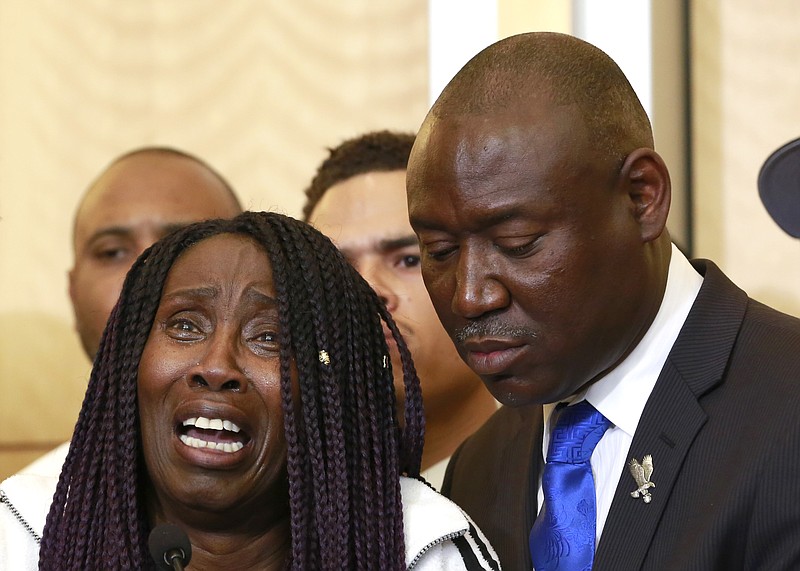It's familiar ground for attorney Benjamin Crump-addressing reporters alongside grieving relatives of unarmed black men killed by police.
With each death, the Tallahassee, Fla., attorney has helped lead community demands against a legal system that some believe is blind and deaf to blacks seeking justice.
With Crump leading the way, Trayvon Martin's parents settled a wrongful death lawsuit against a homeowners association in Florida, where Martin was killed by a white neighborhood watch captain.
The lawyer also helped Michael Brown's family reach a financial settlement with the city of Ferguson, Miss., after Brown was slain by a white police officer.
Now, he is in Sacramento with the family of 22-year-old Stephon Clark, who was shot eight times by police in the backyard of his grandparents' home.
The officers were responding to a report of someone breaking car windows and opened fire because they thought the 22-year-old Clark was pointing a handgun at them. Only a cellphone was found nearby.
"No family should have to endure this pain and suffering as they try to seek answers for an execution of their loved one who was only holding a cellphone," Crump, flanked by members of Clark's family, said at a news conference. Mostly peaceful protests have followed the shooting.
Police have said officers who shot Clark "saw the suspect facing them, advance forward with his arms extended, and holding an object in his hands."
By taking on police and communities in wrongful death and brutality cases, Crump has become a "voice for the voiceless," according to Sean Walton, a Columbus, Ohio-based attorney who also represents families in lawsuits involving police.
"Ben Crump has been a pioneer for his ability to generate attention to matters that normally get swept under the rug," Walton said. "We're actually doing what we can to convince local prosecutors to bring charges against police officers."
Crump is best known for representing the families of Martin and Brown.
Martin, 17, was shot to death in 2012 in Sanford, Florida, by white neighborhood watch captain George Zimmerman, who was later acquitted of all charges.
Brown, 18, was killed by white Ferguson officer Darren Wilson, who was cleared of wrongdoing and later resigned.
Both Martin and Brown were unarmed. Crump said Brown "was executed in broad daylight."
Crump also represents the family of Terence Crutcher, 40, who was shot to death by white Tulsa, Okla., police officer Betty Jo Shelby. Police video showed Crutcher, who was unarmed, walking away from officers and toward his SUV with his hands up when he was shot. A jury found Shelby not guilty of first-degree manslaughter.
Crutcher's estate has filed a civil rights lawsuit against Tulsa, Shelby and other police officers.
"I applaud his tenacity," Crutcher's father, the Rev. Joey Crutcher, said of Crump. "We needed to have a hard-hitting blow from somebody."
Some attorneys who take high-profile cases walk a tight line between representing clients and adhering to ethics, according to Michael Downey of the Downey Law Group in St. Louis, Mo.
Most states have rules to ensure lawyers don't do things outside the courtroom that harms the process inside court, said Downey who teaches courses on legal ethics.
""It has certainly become more common for lawyers to be engaged in aggressive behavior," he said. "The vast majority of them are trying to do civil things-trying to increase the recovery by settlement or judgment."
A 2016 survey of police officers by the Washington-based Pew Research Center shows a significant number of departments have taken steps to reform policies involving interactions between citizens and police, said Rich Morin, Pew senior editor.
"We do know police behavior has changed-some good. Some, depending on the interpretation, not so good," he said.
Morin said nine out of 10 officers reported being concerned about their safety, but three-quarters were reluctant to use force. About three-quarters of people in a separate survey said interactions with police and black residents have become more tense.
"Many said police now are less willing to stop and question people who seem suspicious," he said. "On one hand, you can say 'great! Police aren't rousting folks just for sport.' On the other hand, some will say the police are reluctant to do their jobs these days."

